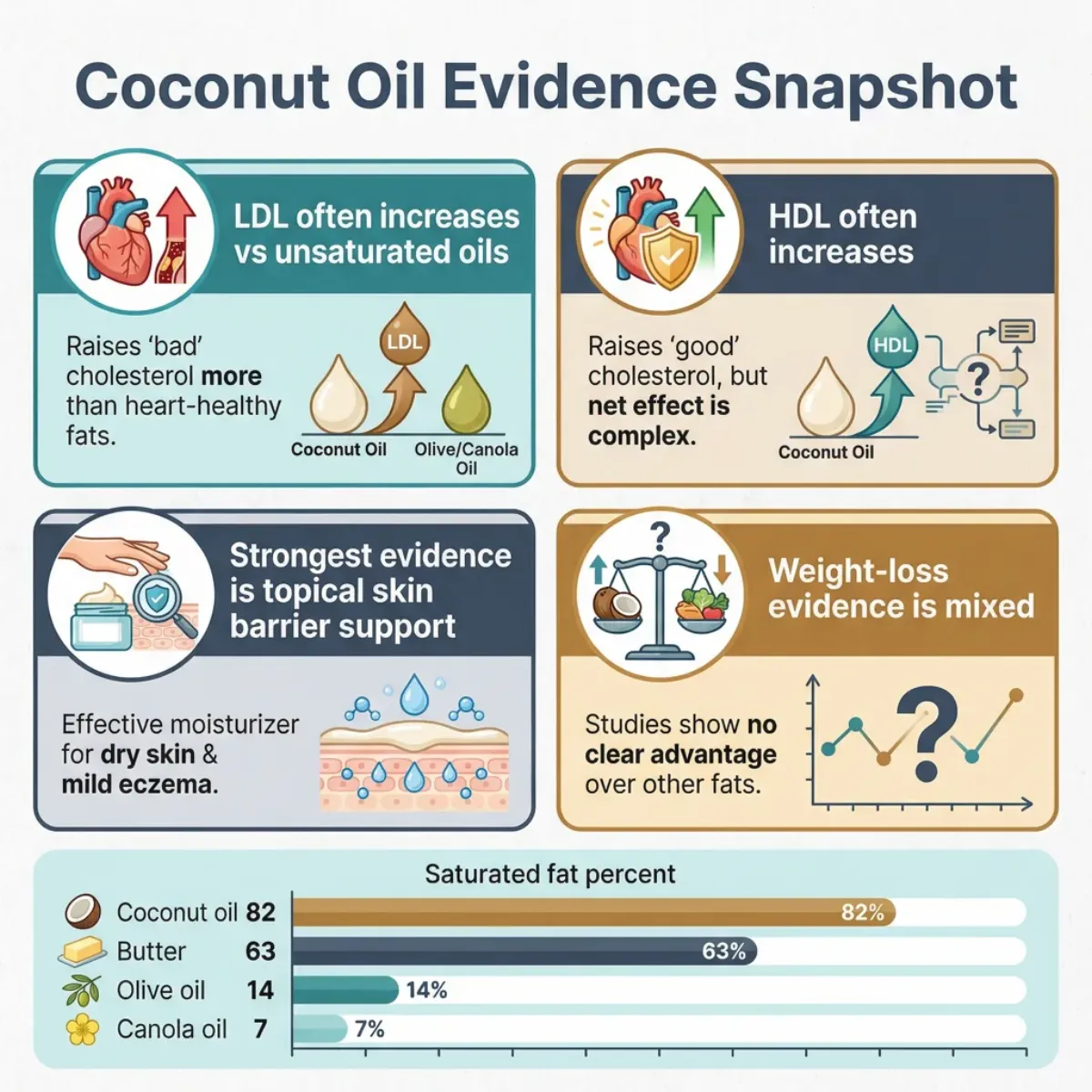
Coconut Oil: 7 Health Benefits, Tradeoffs, and What the Evidence Actually Says
Coconut oil is one of the most argued-over ingredients in modern nutrition. In one feed you will see it called a metabolic superfuel. In the next, you will see it dismissed as just another saturated fat with better branding. Both positions miss important context.
The evidence says coconut oil has legitimate use cases, but not in the way most hype cycles describe. If your question is "Can I use coconut oil?" the answer is usually yes. If your question is "Should this be my default oil for long-term heart health?" the answer is usually no, especially compared with unsaturated oils like extra-virgin olive oil and canola.
This guide breaks down what coconut oil can do, what it probably cannot do, and how to use it in a way that aligns with current evidence instead of social media folklore.
Can Coconut Oil Really Be a Health Food and a Heart Risk at the Same Time?
Yes. The contradiction is real, and it exists because nutrition outcomes depend on what metric you focus on and what oil you are comparing against. Coconut oil can increase HDL in many trials, which sounds positive. But it can also increase LDL versus non-tropical unsaturated oils, which is why heart-health guidance remains cautious.
In practical terms, coconut oil is not poison and it is not a cure. It is a concentrated fat source with a specific fatty-acid profile, meaningful culinary value, and mixed cardiometabolic effects. A more accurate framing is "useful in targeted contexts, limited as a daily default."
Quick fact: Coconut oil works best as an intentional ingredient, not a background "health drizzle" on every meal.
82% Saturated Fat: The Number Driving the Entire Debate
The most important number in this conversation is coconut oil's saturated-fat share. In major guideline discussions, coconut oil is often cited around 82% saturated fat, substantially higher than many common liquid vegetable oils.
Coconut oil is rich in lauric acid (C12:0). You will often hear this framed as "MCT-rich," but that shorthand creates confusion. Regular kitchen coconut oil is not compositionally equivalent to concentrated C8/C10 MCT products used in many weight-loss and cognition trials.

| Composition Point | What We Know | Why It Matters |
|---|---|---|
| Saturated fat share | Commonly cited around 82% in major guideline references. | Higher saturated-fat intake can raise LDL in many people. |
| Dominant fatty acid | Lauric acid is the major component. | Behavior differs from purified C8/C10-heavy MCT formulas. |
| MCT overlap | Contains some shorter-chain fats but less than concentrated MCT oils. | You cannot transfer all MCT trial outcomes directly to coconut oil. |
| Energy density | Calorie-dense, like all oils. | Dose and substitution pattern determine real-world impact. |
From Tropical Staple to Superfood Shelf Star
Coconut has deep cultural and culinary roots in many tropical regions. That history is valid, but modern wellness marketing often strips coconut oil out of its original dietary context. Traditional patterns that include coconut frequently include different total diets, physical activity profiles, and lower ultra-processed-food exposure than many modern Western patterns.
When a single ingredient is extracted from that context and sold as universally protective, evidence quality tends to collapse under headline pressure. That is exactly what happened in many coconut-oil claims over the last decade.
Some claims were directionally plausible but overextended. Others were copied from MCT-specific research and relabeled as coconut-oil outcomes. The result: a lot of confidence, not enough precision.
Why Did Major Guidelines Stay Cautious?
The central reason is consistency of pooled lipid outcomes. Meta-analyses have repeatedly found that coconut oil raises LDL compared with non-tropical vegetable oils while often raising HDL at the same time. That combination is why major organizations prioritize replacement with unsaturated fats for baseline use rather than simply celebrating HDL increases.
Guidelines from global and U.S. institutions continue to recommend limiting saturated fat and replacing it with unsaturated fats where feasible. This is not an anti-coconut ideology. It is a risk-management position based on replacement data.

| Outcome vs Unsaturated Oils | Typical Direction in Pooled Evidence | Confidence |
|---|---|---|
| LDL cholesterol | Often higher with coconut oil | Moderate |
| HDL cholesterol | Often higher with coconut oil | Moderate |
| Triglycerides | Mixed; sometimes modestly favorable | Low to moderate |
| Body weight/fat mass | Little consistent advantage | Low |
| Glycemia/inflammation | Mostly neutral or mixed | Low to moderate |
Quick fact: A rise in HDL does not automatically offset LDL-related risk in all contexts.
Seven Promised Benefits, Ranked by Evidence
The "7 benefits" framing is useful if it is evidence-graded rather than marketing-graded. Below is a practical ranking based on trial quality, consistency, and clinical relevance.
| Claimed Benefit | Evidence Verdict | Practical Interpretation |
|---|---|---|
| Raises HDL cholesterol | Likely true | Observed repeatedly, but not enough to label as heart-protective by default. |
| Improves triglycerides in some groups | Possible, context-dependent | Signal exists in some analyses, effect magnitude and durability still uncertain. |
| Supports weight loss | Weak/inconsistent for regular coconut oil | MCT-specific outcomes are often overgeneralized. |
| Topical skin barrier support | Strongest practical use case | Reasonable trial support in dry-skin and eczema contexts. |
| Oral-health support via oil pulling | Promising but lower-quality evidence | Adjunctive only; not a substitute for standard oral care. |
| Antimicrobial action | Mechanistically plausible | In-vitro evidence stronger than whole-diet clinical outcomes. |
| Brain-energy support | Indirect signal | Most stronger data comes from MCT interventions, not normal coconut oil intake. |


Myth vs Fact: Claims That Keep Circulating
| Myth | Fact |
|---|---|
| "It is plant-based, so it is automatically heart-healthy." | Plant origin does not override fatty-acid profile or replacement effects. |
| "Coconut oil equals MCT oil." | Overlap exists, but concentrated MCT products are compositionally different. |
| "It lowers bad cholesterol." | Compared with unsaturated oils, pooled evidence often shows LDL increase. |
| "It causes fat loss by itself." | Any effect is usually modest and inconsistent in practical diets. |
| "Oil pulling replaces brushing and flossing." | It is at best an adjunct, not a replacement. |
Olive Oil, Butter, or Coconut Oil: What Wins in Real Diets?
Most people do not compare coconut oil with "nothing." They compare it with butter, olive oil, canola oil, or mixed household fats. In that real-world context, coconut oil can look better than butter on some markers, but generally less favorable than unsaturated oils for long-term cardiometabolic strategy.
If your primary goal is LDL/ApoB risk reduction, unsaturated oils remain stronger defaults. If your primary goal is flavor and texture in specific recipes, coconut oil can fit as a limited-use ingredient. The right answer depends on goal hierarchy, not internet slogans.
| If Your Goal Is... | Best Default Choice | Where Coconut Oil Can Fit |
|---|---|---|
| Lower LDL and overall heart-risk profile | Unsaturated oils (olive, canola, soybean, etc.) | Occasional flavor use |
| Recipe texture in certain bakes | Depends on formulation | Useful for structure in some recipes |
| Topical dry-skin support | Targeted emollient strategy | Supported for selected non-open-skin use |
One Tablespoon Can Spend a Large Share of Your Daily Saturated-Fat Budget
A practical reality often gets skipped in online debates: dose. If you are trying to keep saturated fat under common guideline thresholds, one tablespoon of coconut oil can consume a substantial fraction of that daily target. That does not make the oil forbidden. It makes serving size clinically relevant.
People who should be extra careful include those with elevated LDL, elevated ApoB, metabolic syndrome, strong family history of cardiovascular disease, or high baseline saturated-fat intake from other foods.
People who can still use it effectively include those using small amounts for specific culinary outcomes while keeping total saturated-fat intake in check across the entire diet.
Quick fact: Coconut allergy is uncommon but real. A reaction history should be reviewed with a clinician before regular use.
Could Future Research Change the Verdict?
Future work can sharpen guidance, especially with longer randomized trials, better separation of virgin vs refined products, and more subgroup-specific analyses by baseline risk. Right now, we still rely heavily on surrogate markers and short-to-medium intervention windows.
Sustainability discussions also need nuance. Coconut oil is often framed as automatically greener, but land-use and yield comparisons vary by crop, geography, and what is being replaced.
The strongest current position remains pragmatic: coconut oil can be included, but unsaturated oils are still the more evidence-aligned daily baseline for heart-focused dietary planning.
The Most Honest Bottom Line
Coconut oil is not a miracle and not a villain. It is a specialty ingredient with clear strengths in specific contexts and clear limitations as a universal health recommendation. Use it deliberately, not reflexively.
If you care most about long-term cardiovascular risk reduction, let unsaturated oils do most of the daily heavy lifting. Keep coconut oil for flavor, selected applications, and evidence-supported topical use where appropriate.
Sources
- Sacks et al., Circulation, 2017. https://pubmed.ncbi.nlm.nih.gov/28620111/
- Neelakantan et al., Circulation, 2020. https://pubmed.ncbi.nlm.nih.gov/31928080/
- Bueno et al., Nutrients, 2022. https://pubmed.ncbi.nlm.nih.gov/36045407/
- Zhang et al., 2025 meta-analysis (virgin coconut oil). https://pubmed.ncbi.nlm.nih.gov/41444640/
- WHO guideline (saturated fat and trans fat), 2023. https://www.who.int/publications/i/item/9789240073630
- Dietary Guidelines for Americans, 2020-2025. https://www.dietaryguidelines.gov/2020-2025-dietary-guidelines-online-materials/top-10-things-you-need-know
- Cochrane saturated-fat evidence summary, 2020. https://www.cochrane.org/evidence/CD011737_effect-cutting-down-saturated-fat-we-eat-our-risk-heart-disease
- Khaw et al., randomized comparison of butter, coconut oil, and olive oil, 2018. https://pubmed.ncbi.nlm.nih.gov/29511019/
- Evangelista et al., virgin coconut oil and atopic dermatitis, 2014. https://pubmed.ncbi.nlm.nih.gov/24320105/
- Agero and Verallo-Rowell, virgin coconut oil moisturizer trial, 2004. https://pubmed.ncbi.nlm.nih.gov/15724344/
- Our World in Data, palm oil and land-use context. https://ourworldindata.org/palm-oil